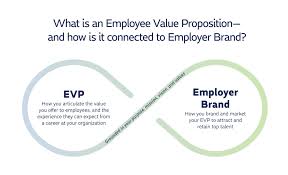Employee Value Proposition: Crafting a Compelling Offer for Talent Attraction and Retention

In the rapidly evolving landscape of talent acquisition and employee engagement, companies are constantly looking for new ways to attract and retain the best talent. One powerful tool that businesses can leverage to achieve this is the employee value proposition (EVP). Simply put, the EVP is the unique set of benefits and opportunities that an organization offers to its employees in exchange for their skills, experience, and commitment.
In the past, many organizations focused solely on compensation and basic benefits as the primary selling points for attracting talent. However, today’s workforce demands more. Employees are looking for companies that align with their values, offer a positive and inclusive work culture, provide opportunities for growth, and support work-life balance. As such, an effective employee value proposition must encompass a wide range of elements that collectively deliver a compelling reason for top talent to join and remain with the company.
In this article, we will explore what makes up a strong EVP, how to develop and communicate it, and why it is a crucial element of your overall talent strategy. Whether you are an HR professional, a business leader, or a recruitment specialist, understanding how to craft and implement a powerful employee value proposition can help you build a motivated, loyal, and high-performing workforce.
What is an Employee Value Proposition (EVP)?
An employee value proposition (EVP) is a set of unique offerings and attributes that an employer provides to its employees in exchange for their skills, experience, and commitment. It is essentially a promise of the value an organization will deliver to its workforce. The EVP encompasses a range of factors, including compensation, career development opportunities, work environment, corporate culture, and employee benefits.
Your EVP is not just a recruiting tool; it’s a critical component of your employer brand. It directly influences employee satisfaction, retention, and overall engagement. When aligned with an organization’s goals and values, the EVP creates a deeper connection between employees and the company, fostering loyalty and improving retention rates.
Why is Employee Value Proposition Important?
The employee value proposition plays a significant role in the success of a business for several reasons:
Attracting Top Talent: In a competitive labor market, candidates are looking for more than just a paycheck. A strong EVP helps you stand out from other employers and attracts the best talent to your organization.
Improving Retention: Employees who feel that their needs and values are aligned with the organization’s offering are more likely to stay. A compelling EVP helps to retain high-performing employees and reduce turnover.
Enhancing Employee Engagement: When employees understand and believe in the value proposition, they are more engaged, productive, and motivated to contribute to the organization’s success.
Fostering a Positive Work Culture: A strong EVP is a reflection of the organization’s culture, values, and mission. It ensures that employees feel connected to the company’s purpose, fostering a sense of belonging and shared goals.
Creating Competitive Advantage: Companies with a clear and attractive EVP have a competitive edge in the talent market. It’s an essential tool for organizations looking to build a strong employer brand and stay ahead of the competition.
Key Elements of an Employee Value Proposition
An effective employee value proposition includes several core elements that work together to create a compelling offer for potential and current employees. These elements go beyond compensation and benefits to address deeper emotional and cultural aspects of the employee experience.
- Compensation and Benefits
At the most basic level, your EVP should address competitive salaries and benefits packages. While this is no longer the only consideration for today’s employees, it remains an essential part of the value proposition. The key here is offering compensation that is in line with industry standards while also providing attractive benefits, such as health insurance, retirement plans, paid time off, and wellness programs.
- Career Development Opportunities
Today’s employees are increasingly looking for opportunities to grow and advance within their organizations. Offering professional development programs, mentorship opportunities, and pathways for career progression can make your EVP much more attractive. Providing employees with the tools and support they need to grow personally and professionally is a key driver of engagement and retention.
- Work-Life Balance
A strong EVP recognizes that employees need flexibility in their work lives to balance personal commitments with professional responsibilities. Offering flexible work arrangements, such as remote work, flexible hours, or paid parental leave, is an essential part of the modern employee experience.
- Company Culture and Values
An organization’s culture is at the heart of its EVP. Companies that foster an inclusive, supportive, and collaborative environment tend to attract employees who share similar values. A strong company culture promotes trust, respect, and open communication, and employees are more likely to feel satisfied and committed to the organization when their values align with the company’s.
- Job Purpose and Impact
Employees want to feel that their work is meaningful and contributes to something larger than just a paycheck. A compelling EVP highlights how an employee’s role is connected to the organization’s mission and values. Offering employees a sense of purpose and impact can significantly increase their engagement and job satisfaction.
- Recognition and Reward Systems
A great EVP includes clear systems for recognizing and rewarding employees for their hard work and achievements. Recognition can come in many forms—verbal praise, bonuses, promotions, or even small gestures of appreciation. Regular recognition boosts morale and motivates employees to continue performing at a high level.
- Work Environment and Facilities
A positive, safe, and comfortable work environment is crucial for employee well-being. Whether it’s a well-designed office space, modern tools and technology, or access to wellness facilities, the work environment plays a significant role in shaping an employee’s experience and job satisfaction.
- Leadership and Management Style
The leadership team plays a critical role in shaping the employee experience. A transparent, approachable, and supportive leadership style fosters trust and encourages employees to feel engaged and motivated. Employees are more likely to stay with a company when they feel that leadership is actively invested in their success.
- Social Responsibility and Sustainability
Today’s workforce is increasingly concerned with corporate social responsibility (CSR) and sustainability. Organizations that demonstrate a commitment to making a positive impact on society and the environment can create a stronger emotional connection with employees who share these values. A focus on CSR initiatives can make your EVP even more compelling.
- Work Relationships and Collaboration
Employees are often looking for a collaborative work environment where they can build meaningful relationships with their colleagues. Fostering teamwork, encouraging collaboration, and providing opportunities for employees to socialize can significantly improve the work experience.
- Job Security and Stability
Employees want to feel secure in their roles and confident in the long-term stability of the organization. Offering job security and being transparent about the company’s financial health and long-term goals can help reduce anxiety and build trust.
- Diversity and Inclusion
A diverse and inclusive workplace where employees from all backgrounds feel valued is an essential element of a strong EVP. Employees want to work in an environment where they can bring their whole selves to work and feel that their unique perspectives are respected.
- Employee Health and Well-being
Beyond physical health benefits, modern EVPs include initiatives that support the overall well-being of employees. Mental health resources, stress management programs, and a focus on work-life integration all contribute to a holistic approach to employee well-being.
- Global Opportunities
For companies with an international presence, offering employees the opportunity to work in different regions or on global teams can be an attractive part of the EVP. These opportunities allow employees to gain valuable experience and exposure to different cultures, which can contribute to career development.
- Transparency and Communication
Open and honest communication is vital to a successful EVP. Employees want to feel informed about company developments, strategies, and changes. A transparent approach fosters trust and ensures that employees feel engaged and valued.
How to Develop an Effective Employee Value Proposition
- Conduct Employee Surveys and Feedback
To develop a meaningful EVP, start by gathering feedback from your current employees. Surveys, focus groups, and one-on-one interviews can help you understand what employees value most about working at your organization and what could be improved.
- Analyze Competitor EVPs
Take the time to research what your competitors are offering in their EVPs. Understanding how your company compares in terms of compensation, culture, and benefits will help you identify areas of opportunity and differentiation.
- Align Your EVP with Company Goals and Values
Ensure that your EVP reflects the company’s broader mission, vision, and values. A disconnect between the EVP and the company’s culture or strategic objectives can create confusion and dissatisfaction among employees.
- Ensure Consistency Across Touchpoints
Your EVP should be consistently communicated across all touchpoints, from job postings to employee onboarding to performance reviews. This consistency reinforces the promise made to employees and helps build trust.
- Tailor Your EVP for Different Audiences
Different employee groups may prioritize different aspects of the EVP. For example, younger employees might value career development opportunities more, while those closer to retirement might prioritize health benefits and job security. Tailor your EVP to address the diverse needs of your workforce.
- Measure the Impact
Once you’ve implemented your EVP, track its impact on employee engagement, satisfaction, and retention. Regularly review and update your EVP based on employee feedback and changing workforce trends.
FAQs
What is the difference between an Employee Value Proposition (EVP) and an Employer Brand?
The employee value proposition (EVP) refers specifically to the unique set of benefits and rewards that an organization offers its employees in exchange for their skills, while the employer brand encompasses the overall reputation and image of the company as an employer. In essence, the EVP is a component of the broader employer brand.
Conclusion
A well-crafted employee value proposition is crucial for attracting and retaining top talent in today’s competitive job market. By focusing on what employees value most, whether it’s career growth, work-life balance, or a positive company culture, businesses can create a compelling offer that speaks directly to the needs and aspirations of their workforce. With a strong EVP in place, companies can foster a more engaged, loyal, and productive workforce, ultimately driving long-term business success




